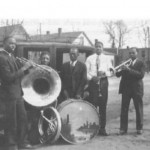The life of Dr. George Washington Buckner spanned a significant period of transition within Indiana’s African-American history.
Born into slavery in Green County, Kentucky in 1855, little George served as personal valet to the master’s son around his own age–laundering his clothing and tidying his toys. At the same time, George found one of McGuffey’s legendary primers and taught himself to read.
Later attending a school run by the Freemen’s Association, by age sixteen George Buckner was himself teaching black children their letters. Moving to Indianapolis a free man, Buckner enrolled in the city’s only school for blacks, run by principal Robert Bruce Bagby.
Although financial straits made for an intermittent education, Buckner subsequently studied at the Terre Haute state “normal” school and the Indiana Eclectic Medical College, from which he was graduated in 1890. Buckner established his medical practice in Evansville, where he also worked to promote African-American equality.
Buckner provided leadership in the Alexander Chapel AME church, the Cherry Street Black YMCA and the United Brotherhood of Friendship; and wrote the “Colored Folks” column in the Indiana Democrat.
Among other influential Hoosiers, the doctor befriended Democratic congressman John W. Boehne, on whose recommendation President Wilson appointed Buckner minister to Liberia in 1913. He also served as U.S. Consul General in Monrovia in 1914
“Receivers of emancipation from slavery and enjoyers of emancipation from sin through the sacrifice of Abraham Lincoln and Jesus Christ;” Dr. Buckner wrote, “Why should not the negroes be exalted and happy?” George Washington Buckner died in 1943 and is buried in Evansville’s Oak Hill Cemetery.






















